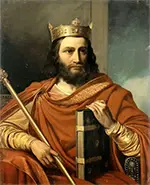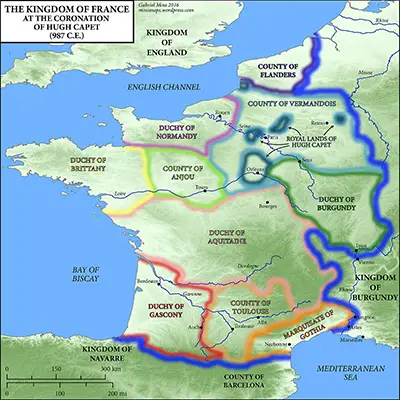Hugh Capet: King of the Franks, Founder of a Dynasty
Hugh Capet was King of the Franks in the late 10th Century. He started a dynasty that lasted into the 14th Century. 
He was born about 938. His father was Hugh the Great, who owned a large amount of land and had been involved in much of the political intrigue of the past few years. The younger Hugh was a nephew of the famous Holy Roman Emperor Otto the Great. Louis V had become King of the Franks in 986, at the age of 20. Rule of his kingdom was, however, more in the hands of two large factions who had competing visions for the future of France:
Louis's uncle, Charles, Duke of Lower Lorraine, was the younger brother of Louis V's father, Lothair, and considered himself to be the rightful heir to throne, through his heredity. Many nobles agreed with him. Hugh Capet's grandfather was King Robert I, a descendant of the famous Robert the Strong. His supporters, known as Robertians, thought that they, the nobles, had the power to elect a king and that kingship shouldn't automatically transfer from father to son. They had succeeded in electing two kings, Odo I in 888 and Robert I in 922. Capet's father, Hugh the Great, was not king but was the most powerful man in France. He had enough influence to make Lothair's predecessor King Louis IV. Hugh the Great died in 956, when Hugh Capet was 15. The teen inherited his father's lands and power and was named Duke of the Franks. 
Capet had used his power and influence to support King Lothair in declaring his son Louis his successor. The king, wary of Capet's power, sought to smooth things over with the Holy Roman Emperor, while also marrying his teenage son to Adelaide of Anjou, in order to gain control of that powerful province. Lothair set out to take more territory and further curtail Capet's power, but the king died in 983, and his son succeeded him. King Louis V died in 987, and the nobles and other powerful men of France turned for their next monarch not to Charles, Duke of Lower Lorraine but Capet, who agreed to give away a large part of his father's lands in order to ensure that he could rule securely, with his son Robert as his successor. Capet had the support as well of Adalberon, the Archbishop of Reims, the most powerful clergyman in the Frankish realm. Charles did not give up his claim to the throne lightly, and Capet's rule was punctuated by repeated battles. Capet and Charles made war on each other, and Capet finally prevailed, in part thanks to the help of another archbishop, Adalberon of Laon, who used the power of his office to trick Charles into being captured and imprisoned. This same archbishop exchanged his loyalty for a plot against Capet in 993, but that was unsuccessful. The king held on for another three years, in 995 foiling another plot, this one to put the son of Charles, Duke of Lower Lorraine on the throne. When Capet died, in 996, his son Robert, having already been named co-ruler, had no challengers, despite the Robertians' initial reluctance to endorse hereditary succession. Capet had married Adelaide of Aquitaine in 970; they had two other children, Gisela and Hedwig. Capet, from his power base in Paris, controlled some of what is now France but not all. His kingdom was nowhere near being the kind of comprehensive unit that the likes of Charlemagne had enjoyed two centuries earlier, but the ravages of war and factional duplicity had diminished the kings' influence through those intervening years. Still, historians refer to the descendants of Hugh Capet as the Capetian dynasty, or the House of Capet. His kingship ended the long-running Carolingian Dynasty. |
|
Social Studies for Kids
copyright 2002–2024
David White




